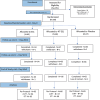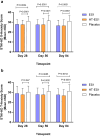A randomized double-blind, placebo-controlled trial to evaluate the safety and efficacy of live Bifidobacterium longum CECT 7347 (ES1) and heat-treated Bifidobacterium longum CECT 7347 (HT-ES1) in participants with diarrhea-predominant irritable bowel syndrome
- PMID: 38630015
- PMCID: PMC11028008
- DOI: 10.1080/19490976.2024.2338322
A randomized double-blind, placebo-controlled trial to evaluate the safety and efficacy of live Bifidobacterium longum CECT 7347 (ES1) and heat-treated Bifidobacterium longum CECT 7347 (HT-ES1) in participants with diarrhea-predominant irritable bowel syndrome
Abstract
To determine the efficacy of the probiotic Bifidobacterium longum CECT 7347 (ES1) and postbiotic heat-treated Bifidobacterium longum CECT 7347 (HT-ES1) in improving symptom severity in adults with diarrhea-predominant irritable bowel syndrome (IBS-D), a randomised, double-blind, placebo-controlled trial with 200 participants split into three groups was carried out. Two capsules of either ES1, HT-ES1 or placebo were administered orally, once daily, for 84 days (12 weeks). The primary outcome was change in total IBS-Symptom Severity Scale (IBS-SSS) score from baseline, compared to placebo. Secondary outcome measures were stool consistency, quality of life, abdominal pain severity and anxiety scores. Safety parameters and adverse events were also monitored. The change in IBS-SSS scores from baseline compared to placebo, reached significance in the ES1 and HT-ES1 group, on Days 28, 56 and 84. The decrease in mean IBS-SSS score from baseline to Day 84 was: ES1 (-173.70 [±75.60]) vs placebo (-60.44 [±65.5]) (p < .0001) and HT-ES1 (-177.60 [±79.32]) vs placebo (-60.44 [±65.5]) (p < .0001). Secondary outcomes included changes in IBS-QoL, APS-NRS, stool consistency and STAI-S and STAI-T scores, with changes from baseline to Day 84 being significant in ES1 and HT-ES1 groups, compared to the placebo group. Both ES1 and HT-ES1 were effective in reducing IBS-D symptom severity, as evaluated by measures such as IBS-SSS, IBS-QoL, APS-NRS, stool consistency, and STAI, in comparison to the placebo. These results are both statistically significant and clinically meaningful, representing, to the best of the authors' knowledge, the first positive results observed for either a probiotic or postbiotic from the same strain, in this particular population.
Keywords: Gut microbiome; IBS-D; IBS-SSS; QoL; abdominal pain; postbiotic; probiotic.
Plain language summary
What is already known on this topicIBS is a chronic functional gastrointestinal disorder characterized by abdominal pain, bloating and abnormalities in stool frequency or form. The gut microbiota of people living with IBS differs markedly to the microbiota of healthy individuals. Gut microbiota may play a key role in IBS aetiology and IBS symptoms may be alleviated by modulating the gut microbiota. Several proposed ways to modulate gut health include normalizing the gut microbiota, preventing the overgrowth of pathogenic bacteria, modulating visceral afferent pathways, and enhancing intestinal barrier function. However, significant heterogeneity between studies, study quality and population, study design and concerns about sample size have limited national and supranational bodies from recommending probiotics for IBS. Further well-powered, randomized, repeatable and controlled trials are warranted.What this study addsThe results of this study substantially contribute to the IBS research field, firstly by providing clinically meaningful and statistically significant results from a rigorous, well designed randomized, placebo-controlled trial and secondly, by exploring the use of postbiotics in IBS, an area of research still in its infancy. Probiotic (ES1) and postbiotic (HT-ES1) supplementation significantly reduced IBS symptom severity scores compared to placebo. This study met primary and secondary outcomes and strongly suggest that ES1 and HT-ES1 could be beneficial in the management of IBS.How this study might affect research, practice, or policyThis study adds to the current evidence base, supporting the use of probiotic/postbiotics for IBS. This research could be used to inform health professionals about using probiotics in IBS and help improve the quality of life and wellbeing for people living with the condition.
Conflict of interest statement
This study was funded by ADM. RD, MN and VV are all employees of ADM but were not involved in the study conduct, data management or statistical analysis.
Figures







References
-
- Sperber AD, Bangdiwala SI, Drossman DA, Ghoshal UC, Simren M, Tack J, Whitehead WE, Dumitrascu DL, Fang X, Fukudo S. et al. Worldwide prevalence and burden of functional gastrointestinal disorders, results of Rome Foundation global study. Gastroenterology. 2021;160(1):99–114. e3. doi:10.1053/j.gastro.2020.04.014 - DOI - PubMed
Publication types
MeSH terms
Substances
LinkOut - more resources
Full Text Sources
Miscellaneous
